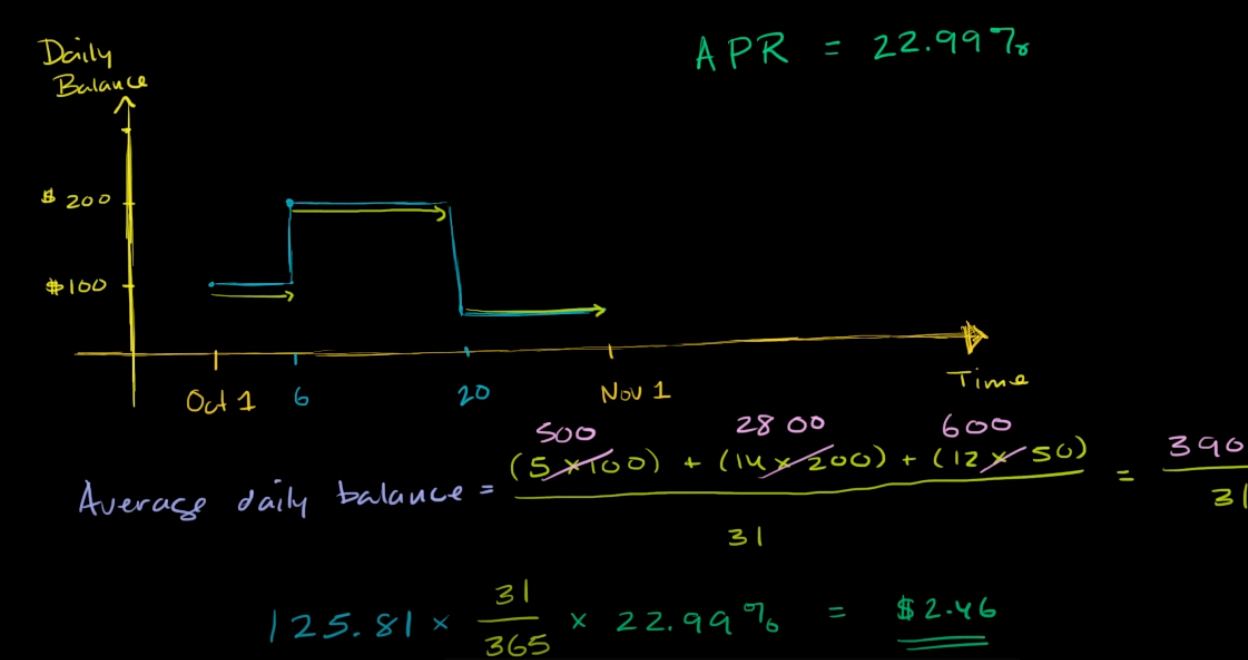1. Saving
Live below your means, look what you earn
Should I spend money on something? optimize the freedom money get rather than the money itself
New grads? save money for what you want
How much should spend?
Marriage? Different styles
Kids, how money works, how things work,
College, consider the growth of tuition and investment
Monthly bills
- Mortgage
- Utilities
- Insurance
- Car loan
2. Interest and Debt
Rule of 72: (very good approximation)
- if APY is 10%, the money would double in 72/10=7.2 years
- if APY is 6%, the money would double in 72/6=12 years
Federal Reserve control the interest rate to contrl the economy
- Low rate: more shopping, more job
- High rate: less shopping,
Credit: FICO, give a score of creadit
Three credit bureaus
- Transunion
- Experum
- Equifax
Interest in credit card
calculate the average daily balance
- if you pay off, no interest
- if there is balance left, you pay below

Build credit, use chime and pya
Processors,each processor have bank in network
- Visa
- Mastercard
- Amex
- Discover
Store should be in the same network to receive the money from the same network
Each payer is providing services, like 2% to the bank
Bankruptcy: if you can’t pay back
- Ancient Greece, become the debt slave
- In prison, family pay off
- Bankruptcy
- Chapter 7: straight, stay on credit report for 10 years, some loan are never forgiven
- Chapter 13: reorganization, pay in the next 3-5 years, stay on
3. Investment
Retirements
- Traditional IRA, gain interest in a larger base. Only taxed when withdraw
- Best if you withdraw after age 60
- Roth IRA,tax not deferred. NO TAX when withdraw
- Best if you withdraw before 60, need more flexible
- And if you in higher tax bracket in retirement
- 401K,very similar to Traditional IRA,pay income tax on total distribution
- Higher limit
- Organized by employer
Penalty: 10%
Different company have different 401K policy. When change job
- to IRA
- to new 401K
- stay in old 401K
Open-ended and Close-ended mutual fund
- Open: can create new share
- Closed: only trade existing share
Exchange Traded Funds: more flexible
Ponzi Scheme: more in than out
Stock: part owner of company, money isn’t guaranteed
Bond: part lender to the company, company pay interest and pay off principle
Asserts: Thins can be in cash
Asserts=Liabilities + equity
fair price should be equity/(share numbers)
Cap=current price * (share numbers)
4. Income
See paycheck
How allowance works
5. Housing
Rent Vs Buy
Buy: stability
- Down payment
- Interest
- prop tax
- house keeping
Rent: flexibility
- gain interest
Consider the out of pocket money,
- Consider how much money burn in every year if you buy or rent
Loan: the longer, the more risky
Short sale
Ballon payment, share the risk between buyer and bank
How to solve
$$
((L(1+i)-P)(1+i)-P)…=0
$$
Solve P
$$
P=L(\frac{1-r}{r-r^{n+1}})
$$
where $r=\frac{1}{1+i}$
Title of the house? Called deeds